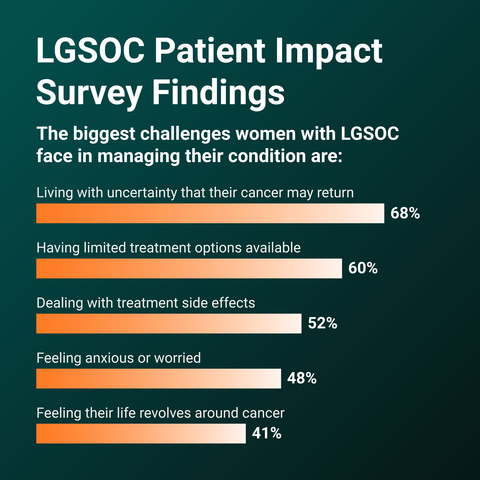First-Of-Its-Kind, Multi-National Patient Impact Survey Reveals Unique Challenges and Gaps in Care for Patients with Low-Grade Serous Ovarian Cancer
Multiple Years for Diagnosis, Limited Treatment Options, Treatment Side Effects, and Cancer Recurrence Main Concerns of Respondents
Survey Developed Through a Global Collaboration Among Patient Advocacy Groups and Medical Leaders to Uncover and Address the Urgent Needs of Patients

The biggest challenges women with LGSOC face in managing their condition (Graphic: Business Wire)
LGSOC is a rare, highly recurrent ovarian cancer associated with slow but persistent tumor growth and a high mortality rate and is known to be relatively resistant to chemotherapy.2,3,4 In 2014, LGSOC was classified as a separate disease compared to the more common high-grade serous ovarian cancer (HGSOC) by the World Health Organization, yet awareness and knowledge of the disease remains low.5 Eighty-five percent of people with LGSOC have their cancer come back after remission.4 Few treatment options are available for LGSOC and no treatments specifically for LGSOC have been approved to date.6
“Not only is LGSOC a rare disease, its classification as a distinct type of ovarian cancer was established within the last 10 years. With no medicines specifically approved by the
Delayed Diagnoses and Low Awareness
Results from the survey revealed the challenges people with LGSOC face in obtaining a timely and accurate diagnosis. Among the
Nearly all those surveyed (
Challenges with Disease Management, Uncertainty and Anxiety
In the survey,
The data also revealed the impact on respondents of navigating a recurrent disease with limited treatment options. Nearly seven-in-ten (
“Since my LGSOC diagnosis, it has been so important to have my community around me. Although LGSOC is classified as a rare cancer, we have seen this community come together to provide support for each other, raise awareness of symptoms, and improve outcomes,” said Nicole Andrews, Board of Directors Chair, STAAR Ovarian Cancer Foundation and a member of the LGSOC Patient Impact Advisory Committee. “What this survey reveals is critical, because there are too many women like me who have had to navigate this experience on their own, with very few resources and low awareness of the disease. Having this measurable, actionable data that sheds new light on the challenges we face because of LGSOC is an important step toward education and awareness that can hopefully improve care.”
About the LGSOC Patient Impact Survey
The LGSOC Patient Impact Advisory Committee, supported by Verastem Oncology, worked with The Harris Poll to conduct a survey on behalf of leaders in the medical and advocacy communities. They surveyed 186 women ages 18+ who have been diagnosed with LGSOC across 10+ countries. The survey was conducted July 31st - August 29th, 2023. Raw data were not weighted and are therefore only representative of the individuals who completed the survey. Additional data from the survey were submitted to an upcoming medical congress.
The sampling precision of Harris online polls is measured by using a Bayesian credible interval. For this study, the sample data is accurate to within ± 7.1 percentage points using a
To view survey details, including methodology, audience demographics, survey data and more, click here. Visit https://letstalkaboutlgsoc.com/resources/patient-impact-survey/ for more information.
*For the purposes of this survey, the term LGSOC refers to people diagnosed with low-grade serous carcinoma of the ovary or peritoneum (the thin layer of tissue lining the abdomen).
**Caution: small sample size (n<100). Results should be interpreted as directional.
About Low-Grade Serous Ovarian Cancer (LGSOC)
Low-grade serous ovarian cancer (LGSOC) is a highly recurrent, chemotherapy-resistant cancer, associated with slow tumor growth and high mortality rate.3 Approximately 6,000 women in the
About Verastem Oncology
Verastem Oncology (Nasdaq: VSTM) is a development-stage biopharmaceutical company committed to the development and commercialization of new medicines to improve the lives of patients diagnosed with cancer. Our pipeline is focused on novel small molecule drugs that inhibit critical signaling pathways in cancer that promote cancer cell survival and tumor growth, including RAF/MEK inhibition and focal adhesion kinase (FAK) inhibition. For more information, please visit www.verastem.com.
1 LGSOC Patient Impact Survey Research Findings. Harris Poll. 2023.
2 WHO Classification of Tumours, 5 Edition, Volume 4: Female Genital Tumours. https://publications.iarc.fr/592
3 Grisham, R. Low Grade Serous Carcinoma of the Ovary. Oncology. 2016. 30(7):650-652. https://www.cancernetwork.com/view/low-grade-serous-carcinoma-ovary. Accessed March 2023.
4 Corrado G, Salutari V, Palluzzi E, Distefano MG, Scambia G, Ferrandina G. Optimizing Treatment in Recurrent Epithelial Ovarian Cancer. Expert Rev Anticancer Ther. 2017; 17:1147-1158. doi: 10.1080/14737140.2017.1398088.
5 Kurman RJ, Carcangiu ML, Herrington CS, Young RH, editors. WHO Classification of Tumors of Female Reproductive Organs, 4th ed; 2014.
6 Ovarian Cancer Guidelines. National Comprehensive Cancer Network. https://www.nccn.org/professionals/physician_gls/pdf/ovarian.pdf. Accessed October 2023.
7 Slomovitz B, Gourley C, Carey S. M, Malpica A, Shih I, Huntsman D, et al. Low-grade serous ovarian cancer: State of the science. Gynecol Oncol. 2020;156(3):715-725. https://doi.org/10.1016/j.ygyno.2019.12.033.
8 Timar J, Kashofer K. Molecular epidemiology and diagnostics of KRAS mutations in human cancer. Cancer and Metastasis Reviews. 2020;39:1029–1038. https://doi.org/10.1007/s10555-020-09915-5.
9 Baines T. A, Xu D, Der C. J. Inhibition of RAS for cancer treatment: the search continues. Future Medicinal Chemistry. 2011;3(14):1787–1808. https://doi.org/10.4155/fmc.11.121.
View source version on businesswire.com: https://www.businesswire.com/news/home/20231107926726/en/
Media Contact:
Lisa Buffington
Corporate Communications
+1 (781) 292-4205
lbuffington@verastem.com
Source: Verastem Oncology







